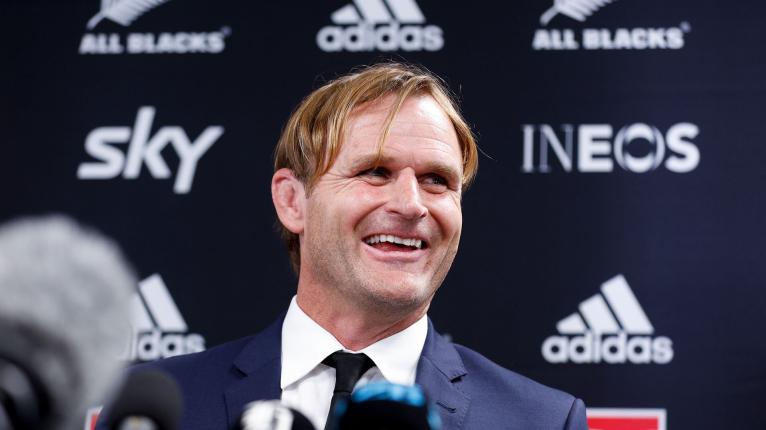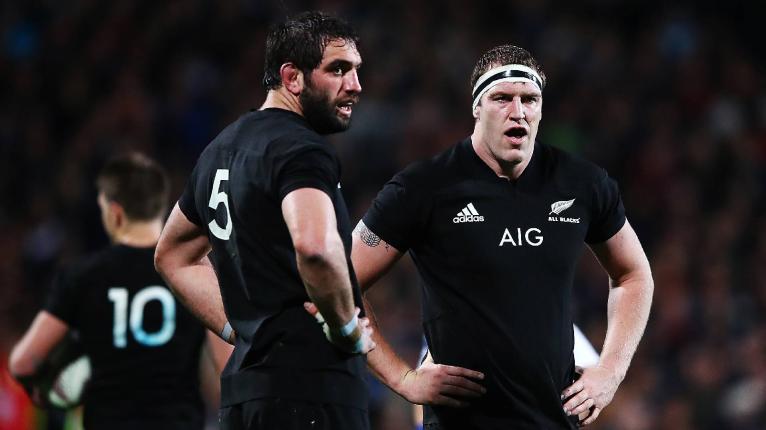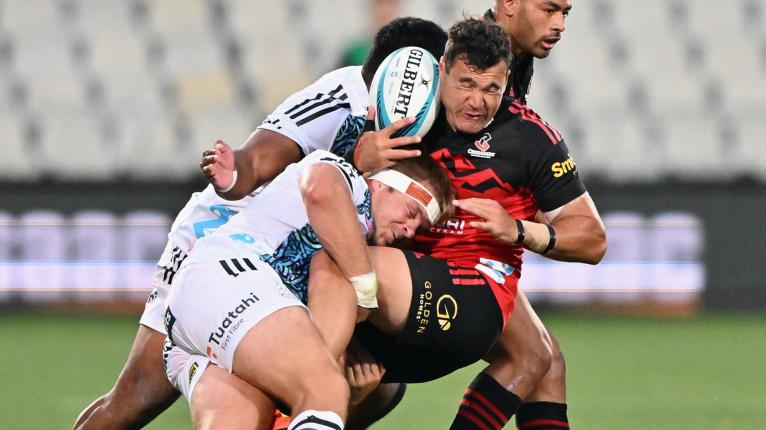Given the tragic state of the game in Australia and the impact that will likely have on Super Rugby Pacific for at least the next World Cup cycle, New Zealand faces a tough decision about what to do about its current All Blacks eligibility rules.
And that time is coming, as earlier this year when he was offered the job of All Blacks head coach, Scott Robertson said one of the first things he intended to do once he took over, was lay out to the board how he saw the player market evolving and why he felt things needed to change.
As he said in April: “We will have conversations, you have got to be a step ahead. If you are a step behind and then changing rules, and that is when you get caught.
“I will present the board where I think the game is heading, potentially, but a lot of that will be happening when I get in the role.”
He’s in the job now, and if anything, the need to reconsider eligibility has only intensified since he made those comments, because the World Cup demonstrated just how tight the margins are between the best teams and just how hard it will be for New Zealand’s players to develop while playing so much Super Rugby against Australians.

Robertson made those comments knowing that that Richie Mo’ounga, still only 28 and maybe only just coming of age as a test No 10, is heading to Japan for three years and therefore unavailable.
He also knew that 23-year-old Leicester Fainga’anuku is going to France, and that Shannon Frizell and Beauden Barrett are on one-year deals in Japan that both could be extended by another season if they so wish.
All four still have plenty to offer as Test players but certainly two of them, and all four of them – if Frizell and Barrett stay in Japan for a second season – will be unavailable for Robertson’s All Blacks in 2024.
And of course, there are other recent All Blacks such as Sam Whitelock, Brodie Retallick, Aaron Smith, Dane Coles and Nepo Laulala who are also heading overseas, and while all five are undoubtedly at an age when their best days are behind them, they would be perfect players to have available to answer an SOS from Robertson next year should an injury crisis occur.
And so this is mostly why Robertson wants to have the discussion with the New Zealand Rugby board sooner rather than later.
He’s likely going to have to start by picking Damian McKenzie as his preferred No 10. McKenzie has 40-plus test caps, but only a handful of starts at first five and for all his talent, it is going to take him time to learn the craft of his position.
The Wallabies, perhaps inadvertently, showed in picking Carter Gordon how hard it is for a young No 10 to find their feet in Test rugby
It is going to take him time to grow into the role and that makes the All Blacks vulnerable, and Robertson may well explain to the board how useful it would be to have Mo’unga available to serve as an alternative as well as a mentor.
And having Barrett available to do much the same thing would be invaluable.
The Wallabies, perhaps inadvertently, showed in picking Carter Gordon how hard it is for a young No 10 to find their feet in Test rugby and there was universal condemnation of Eddie Jones for not also picking a more senior playmaker in the squad such as Bernard Foley or Quade Cooper to help grow the Rebels pivot.
As former All Black Sonny Bill Williams said on Stan Sport: “I feel for Carter Gordon right now because he doesn’t have a Quade Cooper or a Bernard Foley to go back to at the hotel and pull him aside and say, ‘Look bro, these things happen’.”
He may also suggest that with a possible 15 Tests on the cards next year, that it would be a wise plan for the All Blacks to have access to highly-experienced footballers such as Retallick and Smith – just in case.
Robertson will have Scott Barrett, Tupou Vai’i and Josh Lord vying to be his starting locks, and possibly Patrick Tuipulotu, but an injury to one or two of them and the cupboard will be bare.

And it is not too dissimilar at halfback where Cam Roigard, Finlay Christie and Folau Fakatava will be the three of most interest, but none has any great experience and Smith, despite being 34, is in great physical shape and would be the ideal sort of player to have in the squad on limited playing duties.
No doubt, what will also come into Robertson’s presentation is the oddity and inconsistency of him being able to pick Ardie Savea and Sam Cane despite the fact neither will be playing Super Rugby next year.
Both men will be in Japan as part of longer-term NZR contracts and therefore have dispensation to be available for the July series next year. And throughout this cycle, other players who reach the agreed limit of playing 70 tests will qualify for a sabbatical and likely also play a season in Japan.
Razor’s argument may well suggest that it might be worth considering whether players on a two-year club contract in Japan could remain eligible for the All Blacks.
The logic stacks up – it takes a bit of weight off the wage bill and reduces the commercial pressure on NZR and means the All Blacks would be picking players exposed to a different sort of rugby.
And this is just as key as Australia has plunged further in the world rankings and is in such chaos that it’s difficult to imagine Super Rugby Pacific is going to provide the right sort of high-performance environment to produce the sort of players the All Blacks need.
The All Blacks coaches are having to plug gaps in the skill-sets of their players and do yet more heavy lifting to get their players ready for Test football.
That’s the undeniable truth about the competition as it currently stands. There are four high-quality teams in New Zealand – Crusaders, Chiefs, Blues and Hurricanes – while the Australians have one, the Brumbies.
The Drua are a relatively complex team to assess as they are incredibly tough to beat in Fiji and yet their record on the road is not great.
The Highlanders, Reds and Waratahs are teams with potential yet struggle to fulfil it and the Rebels, Force and Moana Pasifika are all probably looking once again at long, difficult campaigns in 2024, even despite some strong recruiting in the off-season.
There’s a couple of different ways to interpret how fit for purpose Super Rugby Pacific is. The first is to say that the transition from the old Super Rugby competition – the 15-team format of 2020 that had five teams from New Zealand, four from Australia, four from South Africa, and the Jaguares and Sunwolves – was difficult.
But with the All Blacks making the World Cup final, that serves as proof that it just took New Zealand’s players and coaches a bit of time to transition, and that the new competition is providing the sort of tough rugby it should be.
Unfortunately, that’s more wishful thinking than anything else and the real story is that the All Blacks coaches are having to plug gaps in the skill-sets of their players and do yet more heavy lifting to get their players ready for Test football.

Super Rugby Pacific simply isn’t providing New Zealand’s players with the consistency of hard, physical rugby that they need, something All Blacks forwards coach Jason Ryan revealed during the World Cup without being explicit.
Asked if Super Rugby was adequately preparing the young props in his charge for the rigours of the World Cup, and the different scrummaging techniques and body shapes that they would face, he said: “It was always enjoyable playing the Boks in Super Rugby in my experience because they are a big forward pack.
“You don’t have that sort of demand in the Super Rugby competition as much as you used to.
“But I think what is important is that you have to run scenarios at trainings and you have to make sure that you are setting guys up to succeed in different situations that you can create through different ways of loading the scrum and engaging. It’s probably not what it used to be, but we have got no excuses, we have to get ourselves right at trainings and we learned that in the test at Twickenham [against South Africa].”
NZR has rigidly stuck by its belief that it can’t budge on its eligibility policy, but Robertson will be hopeful that he can win a few concessions at least as the landscape of 2024 is very different to how it was in 1995.


No body wants that right, but in a way, I think a quick severing of the foot like SA did is probably preferential to trying to hold on to it too long and having it affect your entire body, to the point where it becomes irreversible. But it’s a long way off that now, this is the best start to a cycle we’ve had in regards to player retention.
Oh, btw, good luck for the game tonight. Will be rooting for yuo.
I take back everything I said. NZ and Razor must not, under any circumstances, allow the selection of foreign based NZers.
The longer they hold out on changing, the better. That way the Boks can win the next 2 world cups.
Razor is a good coach. It will be interesting to see how he develops the next phase for the All Blacks. Australian rugby needs a miracle atm. A Rassie type guy that can turn their ship around. The British Lions might as well send a C team at this time. I think Munster or Sasracens can beat the Wallabies. It’s just pathetic
Sir Clive?
Already making excuses for Razor - a post-World Cup player exodus is nothing new and this pales in comparison to some years. He’s a rugby coach not a strategist for the future of NZR. Allowing foreign players in the ABs would make already struggling domestic and super rugby competitions even worse, imagine watching all our best players playing at non-peak times.
Mounga is a good player and with another cycle, could’ve been a great player but we’ve lost much better players than him over the years and still thrived. The rest are all in the twilight of their careers so were not exactly losing them…if a player like Fainganuku wants the cash>ABs then hopefully he’s an outlier like Piutau once upon a time, if not then we have a problem on our hands but it isn’t worth a kneejerk reaction.
We need to focus on improving the spectacle and product for fans in NZ, letting players play abroad is the opposite of this. Super Rugby or NPC needs to be the best comp in the world with better fan engagement and the allure of the ABs jersey needs to be the pinnacle for our players (very fine line between maximizing the commercial return of the ABs and upholding the legacy of it).
Do you think NZ fans would be willing to pay much more for the pleasure of keeping their players in NZ?
Also, even if you made NZ fans eyes pop Out of their heads at the spectacle of NZ rugby - how many fans are we talking about here? 62 million South Africans vs 285 kiwis? Or something like that.
How many of you live on that damp rock anyway?
Your best chances lie with Japan, with all that money and population of 125million, if they invite NZ teams in to compete in their league.
I think the dire lack of good 10’s around the place is new.
Piutau never reached his peak after that and I doubt was ever looked at again. If things have changed I wonder if Lester will be different. Perhaps because he’ll be in the French setup it will be different and NZ could try and hunt him back?
I agree, look at our own back yard first. I’ve always said, if the domestic rugby in NZ/Aus (SR or whatever) doesn’t start accruing international fans, and grow, the game there is dead.
If the RWC taught us one thing it’s that you need a super-deep squad heading into one, injuries happen (2023 also seemed to be a heavy year for this). Baking your talent locally and abroad and letting your best players earn while they can makes sense. A RWC championship is irreplaceable but it doesn’t buy a house in Queenstown
Would we watch international football, if international football teams didn’t pick overseas based players?
Why on earth would we limit ourselves as international rugby teams in this way. Time to get with the times NZ.
It’s not the same comparison because club football is no.1. Players and fans are loyal to their club over their country. People care more about Spurs or Arsenal than they do about England. I don’t know any football supporters who take an England winning the WC over their club winning the Champions League.
Player development is done through clubs not national bodies. What you are suggesting is more akin to picking Messi to play for Barcelona during the Champions League, even though he no longer plays for the club.
Do you think it’s healthy that the same European clubs get all the views Ian? I don’t.
Would you seriously prefer it if South Africa had no pro teams and all their players were in England or France?
And to answer your question, yes, didn’t people watch the English league before it became pro and full of foreigners? I agree that there is a certain special quality about watching the best players compete at the top, but I think having the International sides deliver that appeal, like in Rugby, is a better option than having that be the Champions League teams hold the best players in football. I have always thought it a blight on football that Brazil and Argentina do not have one of the best leagues in the world. Using foreigners is a great for the sport, I think rugby is severely lacking in identifying talent in those none ‘performance’ countries and bringing them through because all slots are taken up by players from NZ SA Aus who can’t earn a living in their own country. If trade in those players was severely reduced I think it speed up the development of players in other areas incredibly and be hugely beneficial to the game.